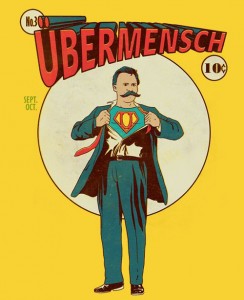Alfred Adler
Alfred Adler coined the term “inferiority complex” and describes it as a lack of worth. This can be associated with redemption. He believed that every person had an idea of what their perfect self would be and calls this fictional finalism. People feel this inferiority complex because they have not attained this fictional finalism. The inferiority complex drives people to their perfect self, dictating the decisions that they make and creating themselves closer and closer to what they see themselves as being. However, people do not fully understand their fictional finalism, they only have an idea that drives them. Adler also believed the conscious and subconscious to be working together to achieve this goal. It goes with redemption because the ideas of an inferiority complex and fictional finalism work to make the person better and develop them in ways not otherwise possible.



Tyler McCuistion on Frankl, The Fall, and Redemption
10:54 pm, 12.04.13
I agree that Frankl is a part of redemption. He was able to inspire so much within himself by just finding meaning in his life. Even though he found out that his family had died in the Holocaust, he was still able to find new meaning in his life. Although the world was falling apart around him and he was fallen, he was able to fight his way back up to the top and become a great psychologist in history.
Tyler McCuistion on Viktor Frankl
10:50 pm, 12.04.13
I like Frankl a lot and absolutely agree that it is important to find meaning in life, regardless of your situation. If people were not able to find meaning in their life, every time that anything bad happened people may just give up and we would never get anywhere in life.
Tyler McCuistion on Therapy and Restoration
10:45 pm, 12.04.13
I really like Rogers’ theory of client centered counseling and unconditional positive regard. It fits great with what we are called to do as Christians. I agree it applies to restoration, because it applies to us as Christians. Using this method, therapists treat people in a non-judgemental attitude.
Tyler McCuistion on Jung: Redemption
9:14 pm, 11.18.13
I like how you related evolutionary psychology into his theory of the collective unconscious. He explains the redemptive qualities of the collective unconscious and you explain it well.
Tyler McCuistion on Skinner - Fall & Redemption
9:06 pm, 11.18.13
I like how you attribute Skinner with redemption. He definitely does try to change behaviors for the good. His research set up many methods we use still today to help people through behavioral issues. We do so by changing their actions and helping them become better people.
Tyler McCuistion on Creation - John B. Watson
6:42 pm, 11.18.13
I agree with you! I wrote on the exact same concept. The experiences that we have create who we are and can be manipulated by others to create who we become. It’s almost scary to think that you can have so little control at younger ages, like what is shown with Little Albert.
Tyler McCuistion on
11:03 pm, 11.04.13
I really enjoyed this post. You mentioned that there could be a problem with our brain drawing lines when no lines are present. Yes that can be dangerous, however, it can do amazing things based on it’s ability to recognize relationships and form thoughts based on that. It is extremely fascinating how perfectly our mind works to overcome problems.
Tyler McCuistion on The Whole Heart
10:55 pm, 11.04.13
I like the thought process behind this. You said that Gestalt psychology teaches us to view things as a whole and not judge them based on anything less than their whole. Relating that to faith was spot on for me. That is what we are called to do by God.
Tyler McCuistion on Freud In All Categories
10:49 pm, 11.04.13
Freud’s theories were so successful in their time because he was able to explain away nearly anything due to his very complete “facts” as he called them. I like how you acknowledged how he encompasses every paradigm in his work.
Tyler McCuistion on Darwin and Creation
8:38 pm, 10.20.13
I definitely see Darwin’s theory as a positive point of view on creation. While I also believe we weren’t born from fish. We have come a long way and evolved in our own small ways over time.